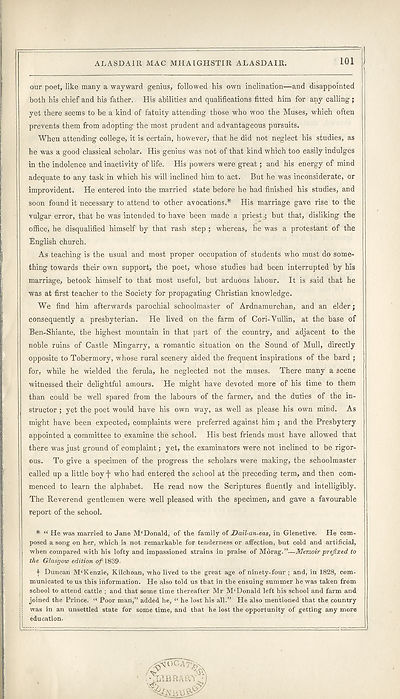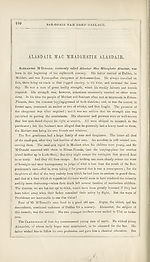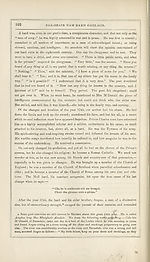Books and other items printed in Gaelic from 1871 to 1900 > Sar-obair nam bard Gaelach, or, The beauties of Gaelic poetry, and lives of the Highland bards
(181) Page 101
Download files
Complete book:
Individual page:
Thumbnail gallery: Grid view | List view

ALASDAIR MAC MHAIGHSTIR ALASDAIR.
101
our poet, like many a wayward genius, followed his own inclination—and disappointed
both his chief and his father. His abilities and qualifications fitted him for any calling;
yet there seems to be a kind of fatuity attending those who woo the Muses, which often
prevents them from adopting the most prudent and advantageous pursuits.
When attending college, it is certain, however, that he did not neglect his studies, as
he was a good classical scholar. His genius was not of that kind which too easily indulges
in the indolence and inactivity of life. His powers were great; and his energy of mind
adequate to any task in which his will inclined him to act. But he was inconsiderate, or
improvident. He entered into the married state beiore he had finished his studies, and
soon found it necessary to attend to other avocations.* His marriage gave rise to the
vulgar error, that he was intended to have been made a priest ^ but that, disliking the
office, he disqualified himself by that rash step ; whereas, he was a protestant of the
English church.
As teaching is the usual and most proper occupation of students who must do some¬
thing towards their own support, the poet, whose studies had been interrupted by his
marriage, betook himself to that most useful, but arduous labour. It is said that he
was at first teacher to the Society for propagating Christian knowledge.
We find him afterwards parochial schoolmaster of Ardnamurchan, and an elder;
consequently a presbyterian. He lived on the farm of Cori-Vullin, at the base of
Ben-Shiante, the highest mountain in that part of the country, and adjacent to the
noble ruins of Castle Mingarry, a romantic situation on the Sound of Mull, directly
opposite to Tobermory, whose rural scenery aided the frequent inspirations of the bard ;
for, while he wielded the ferula, he neglected not the muses. There many a scene
witnessed their delightful amours. He might have devoted more of his time to them
than could be well spared from the labours of the farmer, and the duties of the in¬
structor ; yet the poet would have his own w'ay, as well as please his own mind. As
might have been expected, complaints W'ere preferred against him ; and the Presbytery
appointed a committee to examine the school. His best friends must have allowed that
there wTas just ground of complaint; yet, the examinators were not inclined to be rigor¬
ous. To give a specimen of the progress the scholars were making, the schoolmaster
called up a little boyf who had entered the school at the preceding term, and then com¬
menced to learn the alphabet. He read now the Scriptures fluently and intelligibly.
The Reverend gentlemen were well pleased with the specimen, and gave a favourable
report of the school.
* “ He was married to Jane MLI tonal d, of the family of Dail-un-eas, in Glenetive. He com¬
posed a song on her, which is not remarkable for tenderness or affection, but cold and artificial,
when compared with his lofty and impassioned strains in praise of Morag.”—Memoir prefixed to
the Glasgow edition of \S^.
+ Duncan M‘Kenzie, Kilchoan, who lived to the great age of ninety-four ; and, in 1828, com¬
municated to us this information. He also told us that in the ensuing summer he was taken from
school to attend cattle ; and that some time thereafter Mr M‘Donald left his school and farm and
joined the Prince. “ Poor man,” added he, £< he lost his all.” He also mentioned that the country
was in an unsettled state for some time, and that he lost the opportunity of getting any more
education.
101
our poet, like many a wayward genius, followed his own inclination—and disappointed
both his chief and his father. His abilities and qualifications fitted him for any calling;
yet there seems to be a kind of fatuity attending those who woo the Muses, which often
prevents them from adopting the most prudent and advantageous pursuits.
When attending college, it is certain, however, that he did not neglect his studies, as
he was a good classical scholar. His genius was not of that kind which too easily indulges
in the indolence and inactivity of life. His powers were great; and his energy of mind
adequate to any task in which his will inclined him to act. But he was inconsiderate, or
improvident. He entered into the married state beiore he had finished his studies, and
soon found it necessary to attend to other avocations.* His marriage gave rise to the
vulgar error, that he was intended to have been made a priest ^ but that, disliking the
office, he disqualified himself by that rash step ; whereas, he was a protestant of the
English church.
As teaching is the usual and most proper occupation of students who must do some¬
thing towards their own support, the poet, whose studies had been interrupted by his
marriage, betook himself to that most useful, but arduous labour. It is said that he
was at first teacher to the Society for propagating Christian knowledge.
We find him afterwards parochial schoolmaster of Ardnamurchan, and an elder;
consequently a presbyterian. He lived on the farm of Cori-Vullin, at the base of
Ben-Shiante, the highest mountain in that part of the country, and adjacent to the
noble ruins of Castle Mingarry, a romantic situation on the Sound of Mull, directly
opposite to Tobermory, whose rural scenery aided the frequent inspirations of the bard ;
for, while he wielded the ferula, he neglected not the muses. There many a scene
witnessed their delightful amours. He might have devoted more of his time to them
than could be well spared from the labours of the farmer, and the duties of the in¬
structor ; yet the poet would have his own w'ay, as well as please his own mind. As
might have been expected, complaints W'ere preferred against him ; and the Presbytery
appointed a committee to examine the school. His best friends must have allowed that
there wTas just ground of complaint; yet, the examinators were not inclined to be rigor¬
ous. To give a specimen of the progress the scholars were making, the schoolmaster
called up a little boyf who had entered the school at the preceding term, and then com¬
menced to learn the alphabet. He read now the Scriptures fluently and intelligibly.
The Reverend gentlemen were well pleased with the specimen, and gave a favourable
report of the school.
* “ He was married to Jane MLI tonal d, of the family of Dail-un-eas, in Glenetive. He com¬
posed a song on her, which is not remarkable for tenderness or affection, but cold and artificial,
when compared with his lofty and impassioned strains in praise of Morag.”—Memoir prefixed to
the Glasgow edition of \S^.
+ Duncan M‘Kenzie, Kilchoan, who lived to the great age of ninety-four ; and, in 1828, com¬
municated to us this information. He also told us that in the ensuing summer he was taken from
school to attend cattle ; and that some time thereafter Mr M‘Donald left his school and farm and
joined the Prince. “ Poor man,” added he, £< he lost his all.” He also mentioned that the country
was in an unsettled state for some time, and that he lost the opportunity of getting any more
education.
Set display mode to: Large image | Transcription
Images and transcriptions on this page, including medium image downloads, may be used under the Creative Commons Attribution 4.0 International Licence unless otherwise stated. ![]()
| Permanent URL | https://digital.nls.uk/109811245 |
|---|
| Description | Out-of-copyright books printed in Gaelic between 1631 and 1900. Also some pamphlets and chapbooks. Includes poetry and songs, religious books such as catechisms and hymns, and different editions of the Bible and the Psalms. Also includes the second book ever published in Gaelic in 1631. |
|---|

